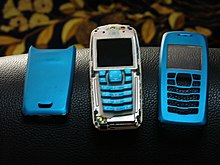Nokia 3100
 |
|
| Manufacturer | Nokia |
|---|---|
| Compatible networks |
3100: 3100b: 3105: CDMA2000 1xRTT |
| Predecessor | Nokia 3510 |
| Successor | Nokia 3200 |
| Form factor | Candybar |
| Dimensions | 102 × 43 × 15.2 mm |
| Weight | 99 g |
| Operating system | Series 40 |
| Memory | 439 KB |
| Battery | BL-5C, 850 mAh |
| Display | 128x128 4096 color CSTN |
| Rear camera | 640x480 VGA (sold separately, added via Pop-Port) |
| Connectivity | None |
The Nokia 3100 is a triband-GSM cellphone released on the 17th of June 2003 as an entry-level phone from Nokia, designed primarily for the younger market.
The Nokia 3100 was developed from the Nokia 6100 as a successor to the Nokia 3510.
The phone is equipped with a 128x128 pixel passive colour display (4096 colors/12-bit), Java MIDP 1.0, XHTML and browser, GPRS, Pop-Port connectivity and Lithium-ion battery. It is also capable of playing polyphonic MIDI files, which can be used as ringtones.
The Nokia 3100 uses Nokia's Series 40 platform firmware that uses large static icons rather than animated icons that are used on some of the other Nokia phones.
The phone can send and receive text and multimedia messages with ringtones and images in BMP, JPEG, PNG and GIF formats. The basic 3100 does not have any voice recorder, radio receiver, MP3 player or camera, while the 3100b variant supports voice recording. A camera can be added to the phone via its Pop-Port.
The Nokia 3200 builds on the features of the Nokia 3100, and incorporates more features from the Nokia 7250i, such as a built-in CIF-resolution camera.
...
Wikipedia
